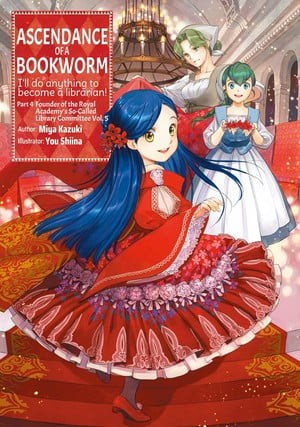Does the Light Novel Translation Process Need AI?
by Lauren Orsini,Tristan “Arkada” Gallant was hooked on Ascendance of a Bookworm, an isekai light novel series that is currently being translated by J-Novel Club. But when Part 5 Volume 4 ended on a cliffhanger, Gallant couldn't bear to wait for the official release. Instead, he plugged the next volume into ChatGPT.

The resulting text was “readable, and in most cases understandable,” Gallant said in a Glass Reflection YouTube video about the experience, expounding comically on ChatGPT's errors and ignored directives. “Do I regret [it]? Not at all,” he said. “But if I had to choose… I would still take a human translator in a heartbeat.”
There's no comparison: human translation is more accurate, nuanced, and well, human, than ChatGPT. But when fans like Gallant need to choose between the “right” translation and a translation “right now,” sometimes they choose machine translation. As machine translation tools under the banner of AI become increasingly accessible and easy to use, the light novel landscape is at a crossroads. Do light novel publishers compromise their product for more speed, and if so, by how much?
One of the biggest buzzwords in light novel translation today is Machine Translation Post-Editing (MTPE). With MTPE, a machine translation tool generates a raw translation, which is then smoothed and localized by a human translator. As an insider at a major light novel publisher told Anime News Network, "Of course, we're looking into MTPE, everyone is." But is that true? More importantly, do AI translation tools really work?
MTPE: A Happy Medium?
Artificial Intelligence (AI) has become a hot-button issue in the translation world. But what we refer to as AI is actually multiple different technologies. Right now, different companies in the anime, manga, and light novel industry are adopting different types of AI with mixed results.
One of the most controversial technologies is Large Language Models (LLMs) like ChatGPT. Users type prompts into the LLM like “please translate this light novel into English,” and the LLM responds by searching the Internet for an approximation of an answer. Recently, Crunchyroll got into hot water when viewers noted a German subtitle for Necronomico and the Cosmic Horror Show that appeared to have been cut and pasted from ChatGPT.
Machine Translation Post-Editing (MTPE) is perceived as a step in between. MTPE can be described as a partnership between a human translator and one or more AI tools. One of the most vocal manga publishing companies using MTPE is Orange Inc. (not to be confused with Studio Orange of BEASTARS and Trigun Stampede). Speaking to Deb Aoki at Comics Beat, Rei Kuroda, Orange's VP of Product, Head of International, said Orange Inc. uses multiple types of translation processes, including one that sounds a lot like MTPE:
“We also have some cases where we start with an AI-generated translation, and human translators will use that as a starting point to review and make edits or adjustments, if needed.” Kuroda immediately added that Orange Inc. would “NEVER publish anything that is only an AI-generated translation.”
Kuroda's strong emphasis on this sentiment is an indicator of how AI tools are being perceived by anime viewers and manga and light novel readers: negatively. When Anime News Network conducted a survey on AI usage in anime, 68% out of 550 respondents said they were “totally unaccepting” of AI being used in manga or anime translation. Concerns included mistranslation (90%), loss of cultural references (83%), and loss of jobs for human translators (79%).
“Fans aren't going to pay for something they can already get for free,” said manga translator Katrina Leonoudakis. “They're paying for the quality they know they'll get from professional translators who understand the words, paragraphs, culture, narrative style, and expectations for writing in both Japanese and English. If LN publishing wants to continue to be viable in this market, they need to continue using human translators, even if it takes longer and costs more.”
In other words, it isn't readers who are clamoring for MTPE. It's companies looking for a workaround that is faster and cheaper than hiring human translators. But does AI deliver?
“Machine learning—the real artificial 'intelligence' that's behind AI—has so many great uses, especially in the medical and engineering fields. The issue consumers have is when it's being used to cut costs and create mediocre products,” said Leonoudakis. “It's a best guess, at best, and as we've seen joked about all over the internet, AI has a track record of guessing wrong.”
How Your Light Novel Translation Sausage Gets Made
While Gallant was busy attempting to translate the next volume of Ascendance of a Bookworm, what was the book's English-language publisher doing? According to Sam Pinansky, the CEO of M12 Media and founder of J-Novel Club (JNC), their in-house translation process “was modeled originally not after traditional publishing houses, but actually on the ways that anime fansubbing groups were organized in the early 2000s” and has changed little since.

“JNC translators submit their manuscripts in weekly bite-sized chunks over 8–14 weeks,” said Andrew Schubauer, a project manager at JNC. “Each week, our editors fix grammatical errors, polish prose, and make the text sing with the translator's oversight.”
Most books spend 9–15 weeks in the translation/editing stage, said Schubauer, with an additional 4 weeks in quality assurance. JNC has adopted in-house tools, including file converters and spelling and grammar checkers, but not AI.
Pinansky said he has experimented with AI tools in his spare time, but does not think that machine translation technology, as it is now, could be implemented into the JNC workflow, which depends on the back-and-forth dialogue between translator and editor. He believes that “sooner or later” fully-automated translation will be possible, but it'll require significant investment up front.
“The main reason it hasn't already is likely because inputting 200,000 characters and spitting out 100,000 words is not a use case that is profitable for the large tech companies, where translation is likely sufficient one business PowerPoint at a time,” said Pinansky.
Once machine translation does rival JNC's process, Pinansky said the community will have some interesting choices to make.
“Do people just accept a fully automated translation that's 'good enough?' Do they pay for the original Japanese version and translate it themselves? Does JNC end up needing to compete, not with pirates per se, but with the original web novels that authors post for free? In a way, is it not better that the original authors can now show their web novels to the entire world and not just Japanese readers?... Is it even worth it for a company like JNC to pursue machine translation to compete if the inevitable decision of the consumer is ‘we don't need you anymore ’?”
Schubauer isn't so sure that machine translation will ever rival human translation.
“Light novels may not be high art, but that does not mean that they are produced without love and care,” he said. “It's an honor to be trusted with a story that an author has poured a piece of their soul into. Can a machine translate a soul?”
If machine translation is about achieving a “good enough” interpretation of a light novel, Leonoudakis said that it's pointless for translation companies to sacrifice human quality for speed because fans already know where to find that.
“The audience that is buying light novels knows where to get light novels for free online. These 'free' English translations are frequently just machine translations of the Narou/publicly available chapters that have been touched up by a savvy fan,” she said. “If publishers want to start using machine translation—even with MTPE—congratulations. You've already been beaten to the punch by fan groups.”
”How in the world am I supposed to compete with that?”
Of all of the people I spoke to on and off the record for this article, the one who was the most optimistic about the capabilities of machine translation was none other than the translator of Ascendance of a Bookworm himself. Quof, as he is known professionally, said he was well aware that fans turn to AI while waiting for him to finish a translation.
“It's a real, serious failing of human beings that we take 5 years to translate [Ascendance of a Bookworm,] a series of 33 books, while AI does it in an afternoon,” he said.
Quof said he does not take MTPE jobs because “I think I have enough skill in Japanese and English that MTL tools do not currently improve my output. It would make my workflow harder because, as one used to providing 97% or higher accuracy, I would feel compelled to fix the AI's errors up to that high standard, and that would slow me down dramatically.” But over the years, Quof has had a habit of checking his own translations against AI tools. Google Translate never fazed him, but he was alarmed at how closely ChatGPT could match his work. Machine translation is far from perfect, but Quof doesn't think a perfect translation is what readers are looking for.
“The grim truth known among publishers is that high translation quality is basically never a factor in how well something sells,” he said. “A particularly bad translation may stir controversy and put people off, but you don't get crowds of buyers rushing to buy something just because it had an excellent translation. You only really need a decent translation.”
Additionally, Quof said a company would have to make a major mistake in order for readers to notice in the first place, pointing to the example of multi-billion dollar company Hoyoverse accidentally leaving in Claude AI messages in the French translation of one of their flagship titles, Honkai Star Rail.

“What's especially notable about these cases are how they would have gone under the radar if not for these blatant mistakes. The user here notes only 'a few quirks lately,' not 'a massive plummeting of quality.' At that point, one must question at all times how much of what they consume has already been replaced by AI without one's knowledge.”
In fact, TO Books, the Japanese publisher for Ascendance of a Bookworm, began a partnership last year with the AI tool Corona EX. These AI-translated chapters directly compete with Quof's livelihood.
“I do think a machine will take my job,” Quof said. “Imagine a world where novels are simultaneously released globally in every language because it's just obvious that once a writer is done MTL will come along and produce translations in every language for it instantly. How in the world am I supposed to compete with that?”
Even though using an LLM scratched Gallant's Ascendance of a Bookworm itch for the short term, he ended up buying Part 5 Volume 5 after all. For Gallant, at least, there was a clear and obvious difference between the AI translation he read first and Quof's official version after.
“The human translated version by Quof is far and away the better translation,” he said. “It's not even close. Even while using the [machine translation] I thought that, and I still do.”
discuss this in the forum (9 posts) |